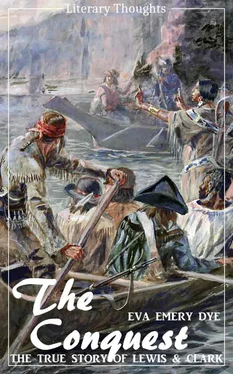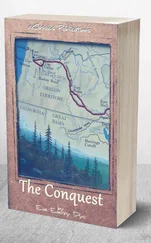Dropping her work, Mrs. Clark, Ann Rogers, a descendant of the martyr of Smithfield, and heir through generations of "iron in the blood and granite in the backbone," looked into the approaching, luminous eyes.
"I hope my son has been a credit to his country?"
"A credit?" exclaimed Jonathan. "Why, mother, Lord Dunmore has offered him a commission in the British army!"
"But I cannot take it," rejoined George Rogers, bending to press a kiss on the cheek of his brown-eyed little mother. "Lord Dunmore means right, but he is misunderstood. And he swears by the King."
"And do we not all swear by the King?" almost wrathfully exclaimed John Clark, the father, entering the opposite door at this moment.
"Who has suffered more for the King than we self-same Cavaliers, we who have given Virginia her most honourable name—'The Old Dominion'? Let the King but recognise us as Britons, entitled to the rights of Englishmen, and we will swear by him to the end."
It was a long speech for John Clark, a man of few words and intensely loyal, the feudal patriarch of this family, and grandson of a Cavalier who came to Virginia after the execution of Charles I. But his soul had been stirred to the centre, by the same wrongs that had kindled Patrick Henry and Thomas Jefferson. These were his friends, his neighbours, who had the same interests at stake, and the same high love of liberty.
"If the King would have us loyal, aye, then, let him be loyal to us, his most loyal subjects. Did not Patrick Henry's father drink the King's health at the head of his regiment? Did not Thomas Jefferson's grandsires sit in the first House of Burgesses in the old church at Jamestown, more than a century before the passage of the Stamp Act? And who swore better by the King? None of us came over here from choice! We came because we loved our King and would not bide his enemies."
George Rogers Clark looked approvingly at his father, and yet, he owed fealty to Lord Dunmore. Even as a stripling he had been singled out for favours.
"I see the storm gathering," he said. "If I choose, it must be with my people. But I need not choose,—I will go to Kentucky."
It was the selfsame thought of Daniel Boone.
"But here are the children!"
Nine-year-old Lucy danced to her brother, William still clung to his hand, and their bright locks intermingled.
"Three red-headed Clarks," laughed the teasing Jonathan.
More than a century since, the first John Clark settled on the James, a bachelor and tobacco planter. But one day Mary Byrd of Westover tangled his heart in her auburn curls. In every generation since, that red hair had re-appeared.
"A strain of heroic benevolence runs through the red-headed Clarks," said an old dame who knew the family. "They win the world and give it away."
But the dark-haired Clarks, they were the moneymakers. Already Jonathan, the eldest, had served as Clerk in the Spottsylvania Court at Fredericksburg, where he often met Colonel George Washington. Three younger brothers, John, Richard, and Edmund, lads from twelve to seventeen, listened not less eagerly than Ann, Elizabeth, Lucy, and Fanny, the sisters of this heroic family.
But George was the adventurer. When he came home friends, neighbours, acquaintances, gathered to listen. The border wars had kindled military ardour with deeds to fire a thousand tales of romance and fireside narrative. Moreover, George was a good talker. But he seemed uncommonly depressed this night,—the choice of life lay before him.
At sixteen George Rogers Clark had set out as a land surveyor, like Washington and Boone and Wayne, penetrating and mapping the western wilds.
To survey meant to command. Watched by red men over the hills, dogged by savages in the brakes, scalped by demons in the wood, the frontier surveyor must be ready at any instant to drop chain and compass for the rifle and the knife.
Like Wayne and Washington, Clark had drilled boy troops when he and Madison were pupils together under the old Scotch dominie, Donald Robertson, in Albemarle.
While still in his teens George and a few others, resolute young men, crossed the Alleghanies, went over Braddock's route, and examined Fort Necessity where Washington had been. They floated down the Monongahela to Fort Pitt. In the angle of the rivers, overlooking the flood, mouldered the remains of old Fort Du Quesne, blown up by the French when captured by the English. The mound, the moat, the angles and bastions yet remained, but overgrown with grass, and cattle grazed where once an attempt had been made to plant mediæval institutions on the sod of North America. As if born for battles, Clark studied the ground plans.
"Two log gates swung on hinges here," explained the Colonel from Fort Pitt, "one opening on the water and one on the land side with a mediæval drawbridge. Every night they hauled up the ponderous bridge, leaving only a dim dark pit down deep to the water."
With comprehensive glance George Rogers Clark took in the mechanism of intrenchments, noted the convenient interior, with magazine, bake-house, and well in the middle.
"So shall I build my forts." Pencil in hand the young surveyor had the whole scheme instantly sketched. The surprised Colonel took a second look. Seldom before had he met so intelligent a study of fortifications.
"Are you an officer?"
"I am Major of Virginia militia under Lord Dunmore."
With a missionary to the Indians, Clark slid down the wild Ohio and took up a claim beyond the farthest. Here for a year he lived as did Boone, beating his corn on a hominy block and drying his venison before his solitary evening fire. Then he journeyed over into the Scioto.
So, when the Dunmore war broke out, here was a scout ready at hand for the Governor. Major Clark knew every inch of the Braddock route and every trail to the Shawnee towns. When a fort was needed, it was the skilled hand and fertile brain of George Rogers Clark that planned the bastioned stockade that became the nucleus of the future city of Wheeling.
Then Dunmore came by. Like a war-horse, Clark scented the battle of Point Pleasant afar off.
"And I not there to participate!" he groaned. But Dunmore held him at his own side, with Morgan, Boone, and Kenton, picked scouts of the border. When back across the Ohio the Mingoes came flying, Clark wild, eager, restless, was pacing before Dunmore's camp.
Beaten beyond precedent by the mighty valour of Andrew Lewis, Cornstalk and his warriors came pleading for peace.
"Why did you go to war?" asked Dunmore.
"Long, long ago there was a great battle between the red Indians and the white ones," said Cornstalk, "and the red Indians won. This nerved us to try again against the whites."
But Logan refused to come.
"Go," said Lord Dunmore, to George Rogers Clark and another, "go to the camp of the sullen chief and see what he has to say."
They went. The great Mingo gave a vehement talk. They took it down in pencil and, rolled in a string of wampum, carried it back to the camp of Lord Dunmore.
In the council Clark unrolled and read the message. Like the wail of an old Roman it rang in the woods of Ohio.
"I appeal to any white man if ever he entered Logan's cabin and he gave him not meat; if he ever came cold and naked and he clothed him not. During the course of the last long and bloody war, Logan remained idle in his cabin, an advocate for peace. Such was my love for the whites, that my countrymen pointed as they passed and said, 'Logan is the friend of the white man.' I had even thought to have lived with you but for the injuries of one man. Colonel Cresap, last Spring, in cold blood and unprovoked, murdered all the relations of Logan, not even sparing my women and children. There runs not a drop of my blood in the veins of any living creature. This drove me to revenge. I have sought it; I have killed many; I have fully glutted my vengeance; for my country I rejoice at the beams of peace. But do not harbour a thought that mine is the joy of fear. Logan never felt fear. He will not turn on his heel to save his life. Who is there to mourn for Logan? Not one."
Читать дальше












